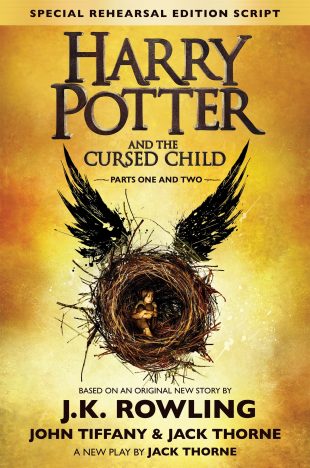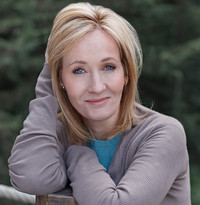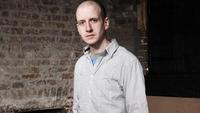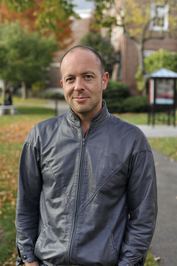My Thoughts on Harry Potter and the Cursed Child
 Harry Potter and the Cursed Child by J.K. Rowling, John Tiffany, Jack Thorne
Harry Potter and the Cursed Child by J.K. Rowling, John Tiffany, Jack Thorne 
Published by Arthur A. Levine Books on July 31st 2016
Genres: Young Adult Fiction, Fantasy
Pages: 327
Source: Purchased
Amazon
Goodreads
* * * * *
Goodreads Synopsis: Based on an original new story by J.K. Rowling, Jack Thorne and John Tiffany, a new play by Jack Thorne, Harry Potter and the Cursed Child is the eighth story in the Harry Potter series and the first official Harry Potter story to be presented on stage. The play will receive its world premiere in London’s West End on July 30, 2016.
It was always difficult being Harry Potter and it isn’t much easier now that he is an overworked employee of the Ministry of Magic, a husband and father of three school-age children.
While Harry grapples with a past that refuses to stay where it belongs, his youngest son Albus must struggle with the weight of a family legacy he never wanted. As past and present fuse ominously, both father and son learn the uncomfortable truth: sometimes, darkness comes from unexpected places.
My Review:
I read Harry Potter and the Cursed Child a few weeks ago and it has taken me this long to decide how I feel about what I read. Conflicted is probably the best way to describe my reaction. There were definitely a few elements that I loved, but at the same time, there were a number of things that were rather disappointing.
As with all play scripts, Harry Potter and the Cursed Child is clearly meant to be watched rather than just read. The written text and descriptions are sparse and somewhat bland because they are waiting for the director and the actors to work their magic and breathe life into it. I actually wish I could see the play because I’m sure it’s wildly entertaining and my review of that would be glowing; however, since I only have the written text to go on, here are my relatively spoiler-free thoughts on the story.
I thought it was very exciting to see a whole new generation of witches and wizards heading off to Hogwarts. It was especially interesting to follow Harry’s son Albus and see how he fared as he tried to live up to his father’s tremendous legacy.
As much I liked Albus, though, and I NEVER thought I would ever say this, but the character who really stole my heart in this story was Draco Malfoy’s son, Scorpius. I can’t really go into details without giving away too much of the play, but the friendship that he forges with Albus Potter when they meet on the way to Hogwarts was just so wonderful to see, probably, in part, because it’s just so completely unexpected to anyone who has read the original books and is familiar with all of the bad blood between Harry and Draco.
* * * * *
That said, one of my biggest disappointments of the story is how little time was actually spent at Hogwarts. Perhaps the timing/pacing works better on stage than it does on paper, but the play breezed through entire years at Hogwarts in the span of just a couple of scenes. This bothered me because, for me, it meant that the most enjoyable parts of the Harry Potter series were stripped away. When I read the books, I always loved all of the normal day-to-day happenings — Harry and his friends going to class, playing Quidditch, their interactions with Hagrid, McGonagal, Snape, the ghosts that roamed the halls, etc. Pardon the pun, but for me, that’s the magic of the Harry Potter series and what makes it so special. To be mostly finished with Hogwarts less than a third of the way through the story left me feeling out of sorts.
Speaking of feeling out of sorts, while I felt very nostalgic about revisiting Harry and the gang all grown up, I have to say the experience wasn’t what I hoped it would be. I don’t know if it was because I was reading a script rather than a novel, but Harry, Ron, and the others just didn’t seem quite like the characters I had grown to love over the years. They just seemed stiff and stilted and several of their personalities, Ginny’s in particular, just seemed off. I know they’re adults now rather than children, and that people grow and change, but it still just seemed a bit off. In considering the way they came across, I can understand why some have said it reminds them of fanfiction. And this is probably a bit shallow on my part, but I was also a little disappointed in the career paths most of them were on. I guess I was expecting bigger and better things for them after having defeated Voldemort all those years ago, but as I read what each of them were up to, I just kept thinking to myself: “Really? That’s it?” Ron, in particular, was a disappointment, as he is just working in the Weasley’s joke shop.
With the exception of enjoying watching Albus and Scorpius becoming friends, I was disappointed enough early on that I actually considered giving up on the story around the halfway point. I’m glad I chose to push on though because I really did enjoy the second half much more than I did the first. It finally started to feel more like a Harry Potter story as the action really picked up and as events from the actual series, such as the Triwizard Tournament from Harry Potter and the Goblet of Fire, were revisited and incorporated into the play’s narrative. It took me about 4 days to read the first half of the play, but I flew through the second half in just a few hours.
* * * * *
Overall, I’d have to say that I liked Harry Potter and the Cursed Child but I had some issues with it. I would still recommend it to any fan of the original series though because I do think it’s an interesting take on where they might be as adults. I also think if you keep in mind that it’s a script rather than a lengthy and descriptive novel like we’re used to reading and adjust your expectations accordingly, then you’ll have a more pleasant reading experience and can just bask in the nostalgia of seeing your favorite characters in a new way.
Rating: Tough to rate, but I’m going to say 3 stars (1-2 stars for the beginning, closer to 5 stars for the second half).



